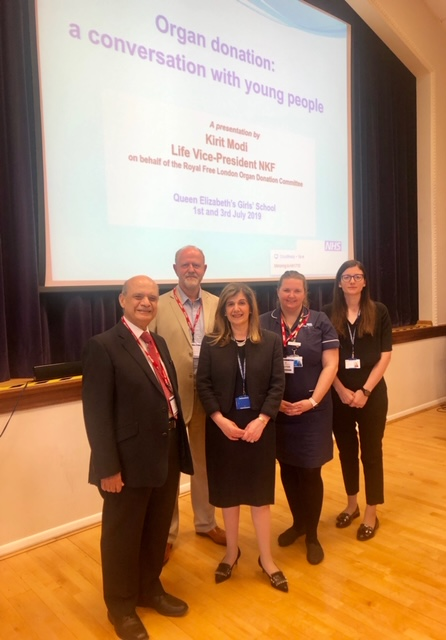
A patient who received a kidney transplant in 2001 visited students at Queen Elizabeth’s Girls’ School in Barnet earlier this month to talk about the change in the law relating to organ donation.
Kirit Modi, who works closely with the Royal Free Hospital Organ Donation Committee (RFHODC), spoke about his experience of transplantation and what the change in the law will mean.
From spring 2020, all adults will be considered to have agreed to be an organ donor when they die unless they have recorded a decision not to donate or are in one of the excluded groups. This is commonly referred to as an “opt out” system.
Four speakers - Peter Ware, Alice Workman, Helen Foley, along with Kirit - explained the organ donation process and the change in law during special assemblies given to Year 10 and Year 12 students on 1 and 3 July 2019.
During the Year 12 assembly there was an in-depth question and answer session with students who are considering a career in medicine.
Violet Walker, headteacher of the school said: “We are delighted to be part of this initiative and pleased to support the RFHODC. Their work is valuable and will have huge impact on saving lives. The messages shared with students and staff were important, thought-provoking and emotive. I was proud that all them were received with an intelligent response.
“Schools are in a position to educate young people from the perspective of a broad curriculum. This has been an example of effective local partnerships. We wish the committee continued success with their important work and would recommend all schools follow our lead.”
Peter Ware, vice-chair of the RFHODC, said: “This was a great opportunity to share the organ donation message with both staff and pupils. Support is on the increase overall and will help the country reach a situation where no one need die for the want of a transplant”.
Kirit has been involved in promoting organ donation for many years. He explained that adults in England need to begin to consider their position on organ donation before the law on “opt out” is implemented in England from spring 2020.
Kirit said: “We need more organ donors to help save lives and the new law enables us to trigger discussion within families about organ donation.
“I am hugely reassured by the positive attitude to organ donation among the general population, and young people in particular. It was a pleasure to have this conversation at the school and I hope that other schools will consider arranging similar events.”
Alice Workman and Helen Foley, who are both specialist nurses for organ donation at the Royal Free London, explained the important role in having conversations with family members of potential organ donors and in supporting them throughout the process.
Alice said: “Within our job we find that the importance of having an end of life conversation with family and friends is pivotal in ensuring a patient’s wishes are met at the end of their life. By presenting this subject to young adults, we hope to make organ donation, and all end of life wishes a regular subject.
Helen added: “We hope to encourage the pupils to recognise the amazing gift of organ donation and discuss this with their friends and families”.
Notes on organ donation
The key points about the change in law on organ donation in England are:
- From spring 2020, the law around organ and tissue donation in England is changing
- All adults in England will be considered as having agreed to donate their own organs when they die unless they record a decision not to donate or are in one of the excluded groups.
- Adults covered by the change will still have a choice whether they want to be an organ donor and their families will still be involved before organ donation goes ahead
- Whatever your decision, make your choice clear to your family and closest friends to ensure your choice is honoured
- You can find answers to commonly asked questions at: www.organdonation.nhs.uk/opt-out-fa
Organ Donation Committees in every NHS hospital trust to drive forward better outcomes for those needing an organ transplant. These committees oversee a hospital’s performance in the organ donation field and spread the word to the whole community about the need to increase the rate of donations. The Royal Free Hospital Organ Donation Committee has been very active in working with local communities in promoting organ donation.
Surveys of the knowledge 50 Y12 students have about organ donation before the assembly and after the assembly showed interesting results. It confirmed that young people are very positive about organ donation with over 95% who said they support organ donation. Knowledge about the change in law increased from 40% before the assembly to 94% afterwards.
Picture caption: (l-r) Kirit Modi, kidney patient, Peter Ware, vice-chair of the RFHODC, Violet Walker, headteacher, Queen Elizabeth's Girls' School, Helen Foley, Royal Free London specialist nurse for organ donation, and Lindsey Southwell, head of Sixth Form, Queen Elizabeth's Girls' School.
 Translate
Translate
